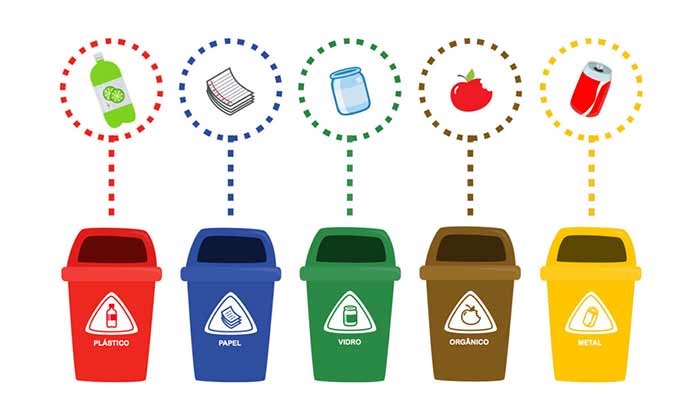ADVERTS
What is selective collection?
Selective collection is defined as the act of collecting and separating materials that can be recycled. It is generally carried out using colored containers identifying the material to be deposited in it. However, other practices can be considered for this process.

See some waste separation tips
In a cardboard box, we can separate recyclable paper: we can deposit boxes, cardboard, office paper, newspapers, magazines, cardboard, among others, as long as they are not too crumpled, dirty with grease or food remains. This way they can be donated to collectors, recycling cooperatives, or to the city's selective collection program, if there is one.
ADVERTS
In another box, very firm, we can place dry waste: plastics, glass and metals. Plastic bags and bags, CDs, floppy disks, cleaning product packaging, yogurt and margarine pots, PET bottles, tubes,
milk and juice bottles, beverage bottles, food product pots, cups, aluminum cans, food product cans, bottle caps, metal frozen packaging, among others. These products must be cleaned to avoid bad odors and the attraction of unwanted animals, in addition to dirt that can harm the work of those who separate these materials for recycling.
People who have gardens or potted plants can separate organic waste, that generated by food waste, and then use it to make compost or even worm farms. This results in nutrient-rich compounds for plants. If they really cannot be reused, they must be placed in a container, called wet waste, which is considered the waste itself, which will be sent to landfills.
Some materials that are not recyclable: Carbon paper, cellophane paper, tracing paper, film paper, waxed or plasticized paper, toilet paper, tissue paper, napkins, photographs, thermosetting plastics, metalized plastic packaging, Styrofoam, mirrors, light bulbs, ampoules of medicines, ceramics, porcelain, TV tubes, cell phones, clips, staples, steel sponges, thumbtacks, nails, among others.
ADVERTS
Batteries, batteries, lamps, used oil and other waste that are the most harmful to the environment must be disposed of in authorized places, so you should seek information in your city.
The “Business Commitment to Recycling” (CEMPRE), is a non-profit association that offers on its website: http://www.cempre.org.br/, a search engine, allowing you to find cooperatives, scrap dealers and recyclers throughout the country. country.
